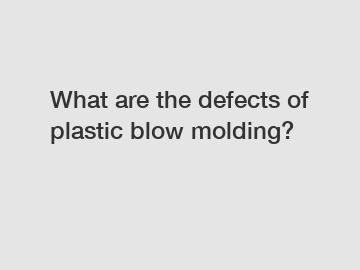What are the defects of plastic blow molding?
Link to TEPAI
Plastic blow molding is a widely used manufacturing process for creating hollow plastic components. It involves melting plastic resin and inflating it into a mold, resulting in the desired shape. While blow molding offers numerous benefits, it also has its own set of defects that need to be considered. In this article, we will discuss some of the common defects associated with plastic blow molding and how they can affect the final product.
1. Uneven Wall Thickness.

Uneven wall thickness is a common defect in blow molded products. It occurs when the molten plastic does not evenly distribute during the inflation process. This can lead to weak spots or areas of excessive thickness, compromising the structural integrity of the product. Uneven wall thickness can cause deformation, warping, or even failure under stress.
2. Poor Surface Finish.
Plastic blow molding can sometimes result in a poor surface finish. This can manifest as roughness, pitting, or waviness on the outer surface of the molded product. Poor surface finish not only affects the aesthetic appeal of the product but also reduces its functional value. It may hinder the ability to stack or package products efficiently, impacting overall productivity.
3. Parting Line Defects.
Parting line defects occur at the point where the two halves of the mold meet. It is the result of misalignment or mismatch between the mold halves, leading to uneven surfaces or flash. Parting line defects can be challenging to overcome as they require careful adjustment and alignment of the mold. If not addressed, it can impact the overall product quality and reliability.
4. Incorporation of Contaminants.
During the blow molding process, contaminants such as dust, debris, or foreign particles can be inadvertently introduced into the mold. These contaminants may cause defects like surface imperfections, weak spots, or structural failures. Proper purification measures and maintenance of a clean manufacturing environment are essential to mitigate the risk of contamination.
5. Porosity.
Porosity refers to the presence of voids or air bubbles within the molded product. It can occur due to inadequate material flow or excessive cooling during the blow molding process. Porosity weakens the structural integrity of the product and may compromise its functionality. It is crucial to optimize process parameters and ensure proper cooling to minimize porosity.
6. Surface Scratches.
Surface scratches can occur during the handling or transportation of blow molded products. These scratches may affect the appearance and functionality of the product, diminishing its value. Appropriate packaging and handling procedures should be implemented to prevent surface scratches and maintain the product's integrity.
In conclusion, while plastic blow molding offers tremendous advantages in terms of cost-effectiveness, design flexibility, and production efficiency, it is not without its defects. Uneven wall thickness, poor surface finish, parting line defects, incorporation of contaminants, porosity, and surface scratches are some of the common defects associated with this manufacturing process. Acknowledging these defects and implementing appropriate measures to overcome them are crucial for achieving high-quality blow molded products.
If you have any further questions about plastic blow molding or require assistance with your manufacturing needs, please do not hesitate to contact us. We are here to provide you with the expertise and support you need to ensure successful product development and production.
If you are looking for more details, kindly visit our website.
If you want to learn more, please visit our website 800ML jerry can blow molding machine.



